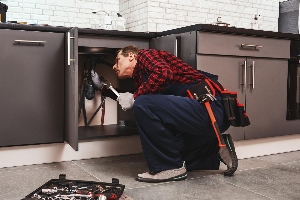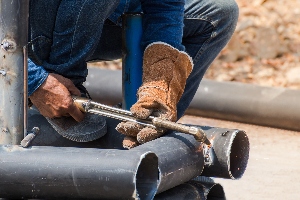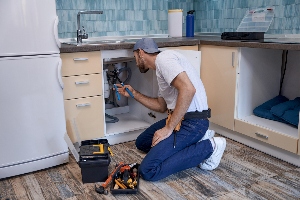Grease buildup in kitchen drains is a common and frustrating issue for many homeowners. Over time, substances like oils, fats, and grease can accumulate inside the pipes, leading to clogs and potential plumbing problems. It's crucial to tackle grease before it solidifies and adheres to your drain walls, which can cause blockages and unpleasant smells. Proper disposal of grease and regular maintenance are essential to prevent issues that can be both inconvenient and costly to repair.
Understand that the key to keeping your kitchen drains clear is prevention. By being mindful of what goes down the sink and employing simple practices, you can protect your pipes from grease-related buildup. Effective measures include discarding grease in the trash rather than rinsing it down the sink, using strainers to catch food debris, and considering the use of a range hood to capture airborne grease during cooking. Additionally, regular flushing of the drains with hot water helps to dissolve and dislodge any grease that may have started accumulating.
Understanding Grease Buildup
In your kitchen, grease buildup in the drains can lead to severe plumbing issues. Recognizing how it occurs and the impact it has is crucial for maintaining a well-functioning drainage system.
Causes of Grease Accumulation
- Cooking Oils and Fats: When you wash dishes, oils and fats from cooking gets carried down your drain. Even when liquid, these substances are prone to solidify when they cool, clinging to the inner surfaces of your pipes.
- Soaps with Animal Fats: Certain soaps contain animal fats, which can also contribute to the layers of grease in your plumbing.
Impact on Drainage Systems
- Blockages: As grease builds up, it narrows the drain passage, which can lead to complete blockages.
- Slow Draining: Even before a full blockage occurs, grease can slow water movement, indicating a need for maintenance.
- Pipe Damage: Over time, corrosive elements can cause wear and degradation to your pipes due to the persistent grease presence.
Routine Drain Maintenance
To ensure your kitchen drain remains free from clogs and runs smoothly, incorporate simple daily habits and conduct regular weekly cleanings.
Daily Practices for Grease Prevention
- Be Mindful of What Goes Down the Drain: Avoid pouring fats, oils, and grease down your drain. Even minimal amounts can accumulate over time.
- Use Sink Strainers: Always have a sink strainer in place to catch food particles and solid waste.
Weekly Cleaning Recommendations
- Boil Water: Once a week, slowly pour a pot of boiling water down the drain to help melt and clear away any early grease buildup.
- Baking Soda and Vinegar: Mix 1/2 cup of baking soda with 1/2 cup of vinegar and pour it down the drain for a fizzy reaction that helps break down residue. Flush with hot water after 10 minutes.
Proper Grease Disposal Techniques
Proper disposal of grease is crucial to maintaining clean kitchen drains. Implementing correct disposal methods can prevent clogs and avoid costly plumbing issues.
Disposable Containers for Grease
- Collect Grease in Heat-Resistant Containers: Immediately after cooking, pour excess grease into a container that can withstand heat, such as an old coffee can or glass jar.
- Seal and Dispose: Once the grease cools and solidifies, securely seal the container and discard it with your regular trash.
Recycling Used Cooking Oil
- Locate a Recycling Facility: Check for local facilities that accept used cooking oil for recycling. Many areas have designated drop-off locations.
- Store Oil Properly for Recycling: Transfer cooled cooking oil into a sturdy plastic container with a lid. When you have accumulated enough, take it to the recycling facility.
Natural Drain Cleaning Solutions
Implementing natural solutions for cleaning your kitchen drain can maintain the system's integrity while avoiding the use of harsh chemicals. The following methods are effective and utilize common household items.
Boiling Water Flushing
Method:
- Boil a pot of water.
- Pour it slowly down the drain to break up and clear grease buildup.
Precautions:
- Exercise caution to avoid burns.
- Use a steady, controlled stream to prevent splashing.
Vinegar and Baking Soda Method
Steps:
- Pour 1/2 cup of baking soda down the drain.
- Follow with 1/2 cup of white vinegar.
- Wait for the fizzing to reduce, then flush with boiling water after 30 minutes.
Benefits:
- Removes buildup with a natural chemical reaction.
- Freshens up the drain by neutralizing odors.
Commercial Grease Management Products
To effectively prevent grease buildup in kitchen drains, you should consider investing in specialized commercial grease management products. These products are designed to break down fats, oils, and greases, preventing clogs and maintaining fluid wastewater disposal.
Enzymatic Drain Cleaners
Enzymatic drain cleaners use beneficial bacteria to break down grease buildup in your drains. These cleaners are:
- Biodegradable: They pose less risk to the environment compared to chemical-based cleaners.
- Effective: Regular application can help maintain clear drains over time.
Apply these cleaners as per the manufacturer's instructions to ensure optimal results.
Grease Dissolving Agents
Grease dissolving agents are chemical solutions formulated to dissolve fats, oils, and greases upon contact. They are:
- Powerful: These agents can quickly clear out thick grease blockages.
- Usage Specific: Should be used sparingly and in accordance with local disposal regulations to prevent environmental harm.
Always use personal protective equipment (PPE) when handling these chemical agents.
Professional Drain Cleaning Services
When dealing with grease buildup in your kitchen drains, sometimes household methods are not enough. This is where professional drain cleaning services come into play.
The Benefits:
- Expertise: Professionals have the experience and knowledge to handle stubborn clogs effectively.
- Equipment: They utilize specialized tools like motorized drain snakes that can cut through the toughest of blockages.
- Preventive Maintenance: Routine cleaning can prevent future blockages and extend the life of your plumbing system.
When to Call the Professionals:
- When you have a persistent clog that home remedies cannot fix.
- If you notice slow draining over time hinting at buildup.
- To conduct preventive maintenance and keep your drains flowing freely.
The Service Process:
- Assessment: Technicians often start with an inspection of your drainage system to determine the source and severity of the clog.
- Cleaning: Using professional-grade equipment, the technician will clean out any grease accumulation, ensuring complete removal.
- Guidance: After the cleaning, they may offer advice on how to maintain your drains and prevent future issues.
Remember, ignoring a clogged drain can lead to more serious plumbing issues. If in doubt, it's wise to consult with a professional to address your kitchen drain concerns effectively.
Preventive Plumbing Modifications
Making changes to your plumbing system can significantly reduce the risk of grease buildup. These modifications are designed to catch or filter out grease before it enters your pipes.
Grease Traps Installation
Grease traps, sometimes known as grease interceptors, are devices installed within your drain system designed to trap fats, oils, and grease (FOG). They require professional installation and come in different sizes to fit your kitchen's needs. Here's a quick overview:
- Placement: Typically installed under the sink or near the dishwasher.
- Maintenance: Regular cleaning and maintenance are essential to ensure effectiveness.
Drain Strainers and Filters
Drain strainers and filters act as a physical barrier to prevent solid waste and grease from going down the drain. They're simple yet effective tools for any kitchen:
- Types: Choose from mesh strainers, stainless steel baskets, or silicone stoppers.
- Care: Clean regularly to prevent blockages and maintain water flow.
Educating Household Members on Grease Disposal
Proper grease disposal is essential to maintain your kitchen drain's functionality. By educating your household on correct methods, you can prevent blockages and extend the lifespan of your plumbing.
Collection: Keep a container close to where you cook. This receptacle should be able to handle the heat without deforming. Instead of pouring grease down the drain, pour it into this container.
- Hot Grease: Allow it to cool slightly, but while still liquid, carefully pour it into the container.
- Solid Fats: Scrape these off cookware and plates directly into the bin.
Solidification: Once in the container, allow the grease to cool and solidify. If it's a small amount, it may solidify quickly. Larger quantities might need more time.
Disposal: After the grease has solidified, seal the container and discard it with your regular trash. Alternately, some communities offer grease recycling programs—check your local resources.
Cleaning Cookware: Use a paper towel to wipe greasy pans before washing. This step removes a significant amount of grease that might otherwise end up in the drain.
Remember, communication is key—make sure all household members understand these steps. Here's a quick-reference for your kitchen:
Step
Action
Collect
Use a heat-resistant container for live grease.
Solidify
Allow grease to cool and harden in the container.
Dispose
Throw away or recycle solidified grease appropriately.
Clean Cookware
Wipe off excess grease with a paper towel before washing.
Regular briefings on these practices ensure everyone plays a role in preventing clogged drains.
Emergency Actions for Grease Blockages
When faced with a grease blockage, immediate action can help mitigate the problem before it escalates. Knowing when to call a professional is also crucial for preventing further damage to your plumbing system.
Immediate Response to Clogs
If you discover a grease blockage in your kitchen drain, act quickly to prevent a full clog. Boiling water is one of the first and simplest remedies; carefully pour a kettle of boiling water down the drain to help dissolve the grease. If the clog persists, use a DIY solution of vinegar and baking soda. Combine 1/3 cup of baking soda with 1/3 cup of vinegar and immediately pour the mixture down the clogged drain. The resulting fizzing action can help to break down the grease buildup.
When to Contact a Professional
If your efforts have little effect and the blockage remains, it might be time to call a professional plumber. Persistent clogs, especially those that cause water to back up, could indicate a more severe issue within the drainage system that requires expert attention. Contacting a professional is particularly important to avoid potential damage from incorrect use of over-the-counter chemical drain cleaners or more invasive tools like drain snakes.
Book your drain cleaning service with a trusted, reputable plumber like One Call Plumbing.












